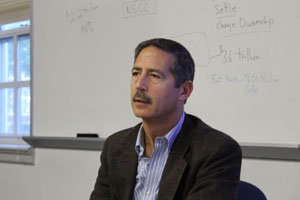A seasoned communicator reflects on his illustrious career
When Stuart Goldstein ’72 stepped down after 20 years at the DTCC, the editor of one magazine called him “the highest profile communications executive in the securities services industry.”


Stuart Goldstein ’72 might be retired from the communications business, but he is never at a loss for words. While a student at what was then known as Trenton State College, Goldstein worked tirelessly to change the voting age from 21 to 18, and he leveraged those skills to enjoy an illustrious career, first in New Jersey government and politics, and then in communications in the financial industry.
Until last year, he was managing director of corporate communications and public affairs at the Depository Trust & Clearing Corporation (DTCC) in Manhattan, which settles, or clears, large volumes of stock trades between sellers and buyers. (In other words, Goldstein explained, the DTCC verifies the trade information between two sides of the trade.)
“For example, if Merrill Lynch is engaged in buying stock, and Smith Barney is engaged in selling at the New York Stock Exchange, DTCC confirms the trade terms to both sides and helps the firms “settle” their financial obligations,” he said.
Prior to that role, Goldstein worked in a similar position at another clearing corporation, and before that he was director of corporate communications at American Express. He started his financial career at Citicorp/Citibank, rising to vice president and deputy director in the National Public Affairs department.
When Goldstein stepped down after 20 years at the DTCC, the editor of Global Custodian, a trade magazine, called him “the highest profile communications executive in the securities services industry.” As if that weren’t praise enough, he added that, “In a position where few survive more than five years and one CEO, Goldstein managed four times the average tenure, and served three successive CEOs.”
Goldstein’s longevity in the corporate world offers a lesson both for soon-to-be graduates about to start their career as well as for those already out in the trenches. As his career illustrates, the key is to choose a career you’re passionate about so that you find it rewarding and in turn, give it your best. For anyone wanting to enter public relations—whether working for an agency or corporate communications—he advises working for a newspaper or political campaign for two years. Particularly in the latter, “You’ll learn how to think of multiple strategies, not just one,” said Goldstein.
Goldstein has spoken to numerous classes at TCNJ since graduating, most recently this past fall, to a Crisis Communications class. That evening, he explained how he handled a number of crisis situations in his career, such as his actions when an important member of the staff passed away. He also discussed his strategy when he was caught in London on 9/11, the press was calling to see if trades were settling in the U.S., and he couldn’t reach the DTCC CEO. First, you have to know the business, he suggested; next, you need a sense of how the CEO might address the situation; and finally, you have to improvise. “You can’t go too far out on a limb, but you have to be responsive to the media,” he noted.
Ask what professor influenced him as an undergraduate, and the former executive doesn’t hesitate: David McGrail, for a freshman English course called Language in Thought and Action, in which McGrail taught Goldstein about bias in the media and how to think in multiple ways.
“It was a foundational influence for me, because it got me attuned to how to write to persuade people. Dr. McGrail was irascible and sarcastic at times; he’d poke at things and made the class interesting,” he said.
Goldstein wrote to McGrail years later to tell the professor he was probably his biggest influence. “Professors often take for granted that they won’t hear from us when we graduate, yet they’re the ones who prepare us for what we do,” he mused.
Posted on February 15, 2013

